Strategies for Managing Employee Stress: A Research Report
VerifiedAdded on 2023/06/06
|8
|1884
|450
Report
AI Summary
This research report delves into the multifaceted issue of workplace stress, particularly within the hospitality industry, examining its impact on employee well-being and retention. It analyzes various stressors such as work-life conflict, interpersonal tensions, lack of role clarity, and emotional exhaustion, drawing upon studies that highlight the challenges faced by employees in sectors like hotels and smile factories. The report discusses strategies for mitigating stress, including fostering a better work-life balance, providing adequate training and career development opportunities, and addressing issues like employee turnover and aggression in the workplace. It emphasizes the importance of organizational support, employee empowerment, and attention to both employee and guest needs to create a more positive and sustainable work environment. Desklib offers additional resources, including past papers and solved assignments, to further assist students in understanding these critical management concepts.
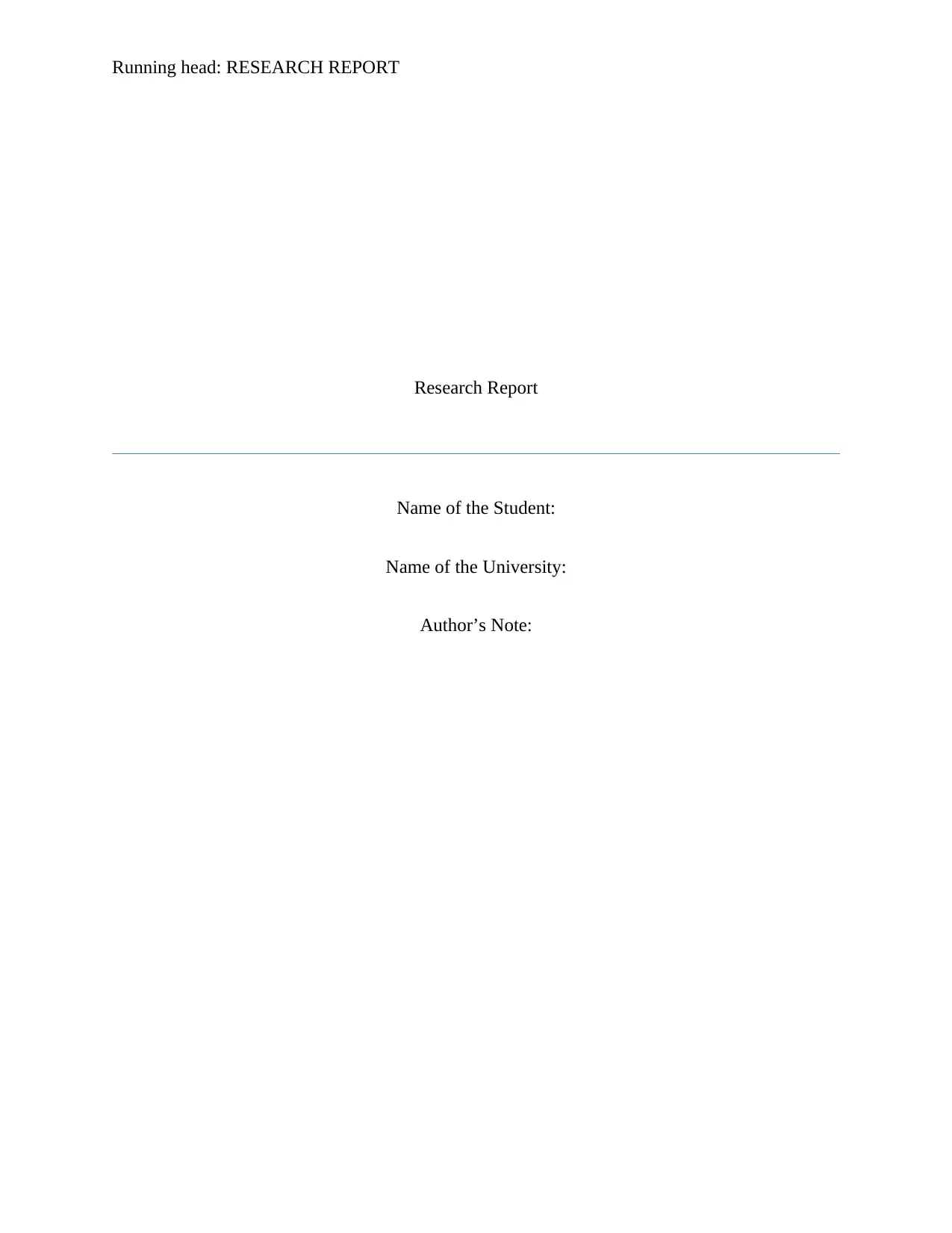
Running head: RESEARCH REPORT
Research Report
Name of the Student:
Name of the University:
Author’s Note:
Research Report
Name of the Student:
Name of the University:
Author’s Note:
Paraphrase This Document
Need a fresh take? Get an instant paraphrase of this document with our AI Paraphraser
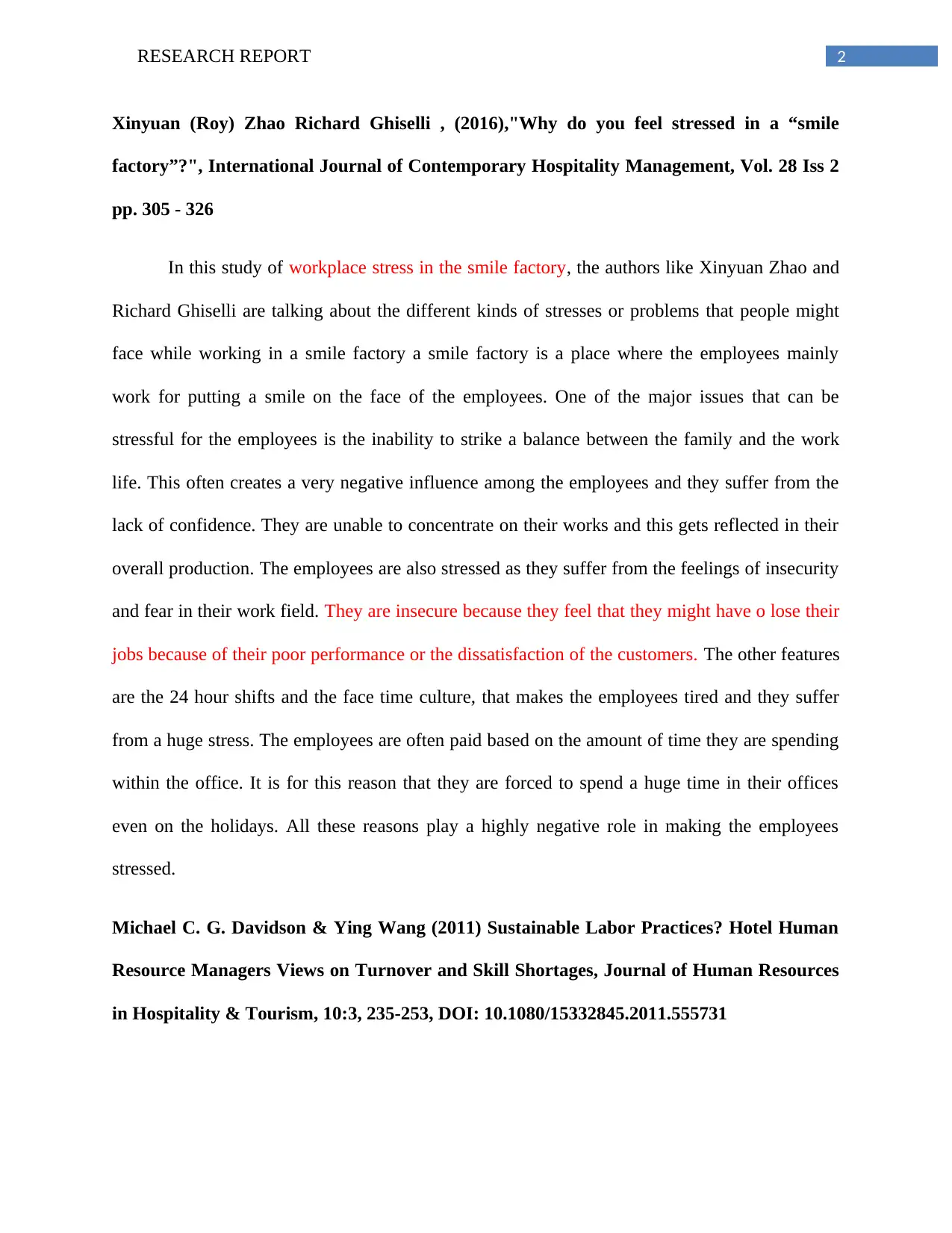
2RESEARCH REPORT
Xinyuan (Roy) Zhao Richard Ghiselli , (2016),"Why do you feel stressed in a “smile
factory”?", International Journal of Contemporary Hospitality Management, Vol. 28 Iss 2
pp. 305 - 326
In this study of workplace stress in the smile factory, the authors like Xinyuan Zhao and
Richard Ghiselli are talking about the different kinds of stresses or problems that people might
face while working in a smile factory a smile factory is a place where the employees mainly
work for putting a smile on the face of the employees. One of the major issues that can be
stressful for the employees is the inability to strike a balance between the family and the work
life. This often creates a very negative influence among the employees and they suffer from the
lack of confidence. They are unable to concentrate on their works and this gets reflected in their
overall production. The employees are also stressed as they suffer from the feelings of insecurity
and fear in their work field. They are insecure because they feel that they might have o lose their
jobs because of their poor performance or the dissatisfaction of the customers. The other features
are the 24 hour shifts and the face time culture, that makes the employees tired and they suffer
from a huge stress. The employees are often paid based on the amount of time they are spending
within the office. It is for this reason that they are forced to spend a huge time in their offices
even on the holidays. All these reasons play a highly negative role in making the employees
stressed.
Michael C. G. Davidson & Ying Wang (2011) Sustainable Labor Practices? Hotel Human
Resource Managers Views on Turnover and Skill Shortages, Journal of Human Resources
in Hospitality & Tourism, 10:3, 235-253, DOI: 10.1080/15332845.2011.555731
Xinyuan (Roy) Zhao Richard Ghiselli , (2016),"Why do you feel stressed in a “smile
factory”?", International Journal of Contemporary Hospitality Management, Vol. 28 Iss 2
pp. 305 - 326
In this study of workplace stress in the smile factory, the authors like Xinyuan Zhao and
Richard Ghiselli are talking about the different kinds of stresses or problems that people might
face while working in a smile factory a smile factory is a place where the employees mainly
work for putting a smile on the face of the employees. One of the major issues that can be
stressful for the employees is the inability to strike a balance between the family and the work
life. This often creates a very negative influence among the employees and they suffer from the
lack of confidence. They are unable to concentrate on their works and this gets reflected in their
overall production. The employees are also stressed as they suffer from the feelings of insecurity
and fear in their work field. They are insecure because they feel that they might have o lose their
jobs because of their poor performance or the dissatisfaction of the customers. The other features
are the 24 hour shifts and the face time culture, that makes the employees tired and they suffer
from a huge stress. The employees are often paid based on the amount of time they are spending
within the office. It is for this reason that they are forced to spend a huge time in their offices
even on the holidays. All these reasons play a highly negative role in making the employees
stressed.
Michael C. G. Davidson & Ying Wang (2011) Sustainable Labor Practices? Hotel Human
Resource Managers Views on Turnover and Skill Shortages, Journal of Human Resources
in Hospitality & Tourism, 10:3, 235-253, DOI: 10.1080/15332845.2011.555731
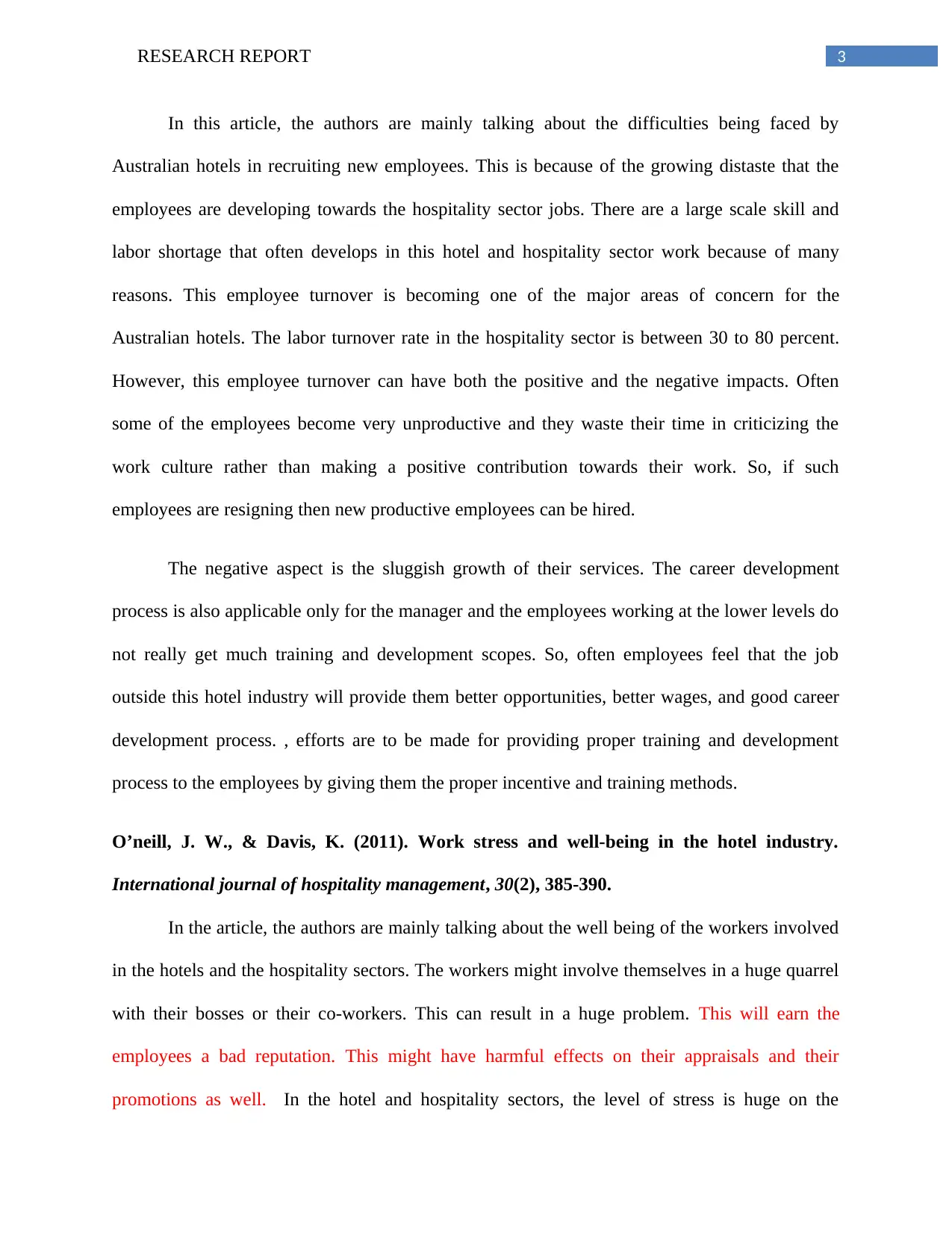
3RESEARCH REPORT
In this article, the authors are mainly talking about the difficulties being faced by
Australian hotels in recruiting new employees. This is because of the growing distaste that the
employees are developing towards the hospitality sector jobs. There are a large scale skill and
labor shortage that often develops in this hotel and hospitality sector work because of many
reasons. This employee turnover is becoming one of the major areas of concern for the
Australian hotels. The labor turnover rate in the hospitality sector is between 30 to 80 percent.
However, this employee turnover can have both the positive and the negative impacts. Often
some of the employees become very unproductive and they waste their time in criticizing the
work culture rather than making a positive contribution towards their work. So, if such
employees are resigning then new productive employees can be hired.
The negative aspect is the sluggish growth of their services. The career development
process is also applicable only for the manager and the employees working at the lower levels do
not really get much training and development scopes. So, often employees feel that the job
outside this hotel industry will provide them better opportunities, better wages, and good career
development process. , efforts are to be made for providing proper training and development
process to the employees by giving them the proper incentive and training methods.
O’neill, J. W., & Davis, K. (2011). Work stress and well-being in the hotel industry.
International journal of hospitality management, 30(2), 385-390.
In the article, the authors are mainly talking about the well being of the workers involved
in the hotels and the hospitality sectors. The workers might involve themselves in a huge quarrel
with their bosses or their co-workers. This can result in a huge problem. This will earn the
employees a bad reputation. This might have harmful effects on their appraisals and their
promotions as well. In the hotel and hospitality sectors, the level of stress is huge on the
In this article, the authors are mainly talking about the difficulties being faced by
Australian hotels in recruiting new employees. This is because of the growing distaste that the
employees are developing towards the hospitality sector jobs. There are a large scale skill and
labor shortage that often develops in this hotel and hospitality sector work because of many
reasons. This employee turnover is becoming one of the major areas of concern for the
Australian hotels. The labor turnover rate in the hospitality sector is between 30 to 80 percent.
However, this employee turnover can have both the positive and the negative impacts. Often
some of the employees become very unproductive and they waste their time in criticizing the
work culture rather than making a positive contribution towards their work. So, if such
employees are resigning then new productive employees can be hired.
The negative aspect is the sluggish growth of their services. The career development
process is also applicable only for the manager and the employees working at the lower levels do
not really get much training and development scopes. So, often employees feel that the job
outside this hotel industry will provide them better opportunities, better wages, and good career
development process. , efforts are to be made for providing proper training and development
process to the employees by giving them the proper incentive and training methods.
O’neill, J. W., & Davis, K. (2011). Work stress and well-being in the hotel industry.
International journal of hospitality management, 30(2), 385-390.
In the article, the authors are mainly talking about the well being of the workers involved
in the hotels and the hospitality sectors. The workers might involve themselves in a huge quarrel
with their bosses or their co-workers. This can result in a huge problem. This will earn the
employees a bad reputation. This might have harmful effects on their appraisals and their
promotions as well. In the hotel and hospitality sectors, the level of stress is huge on the
⊘ This is a preview!⊘
Do you want full access?
Subscribe today to unlock all pages.

Trusted by 1+ million students worldwide
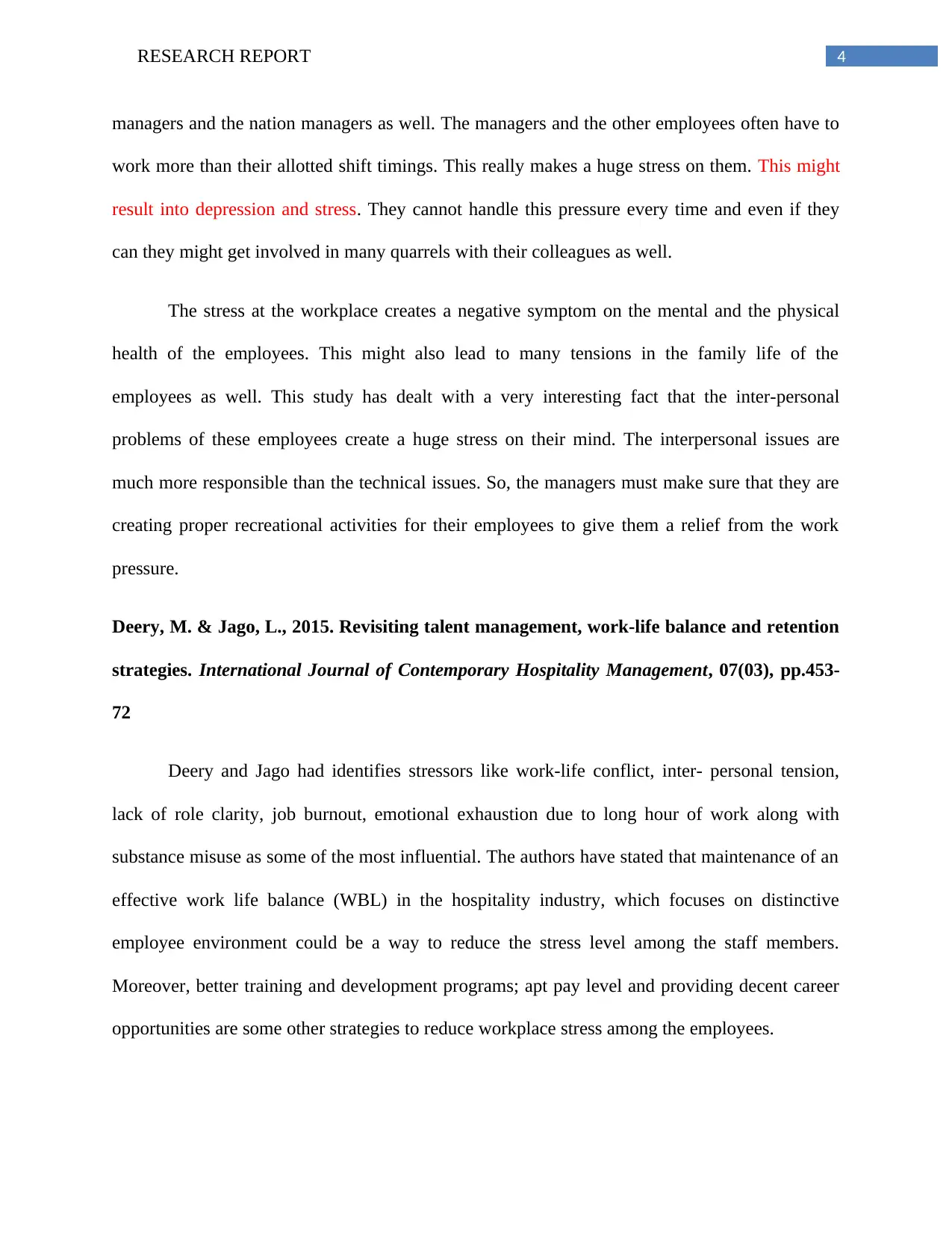
4RESEARCH REPORT
managers and the nation managers as well. The managers and the other employees often have to
work more than their allotted shift timings. This really makes a huge stress on them. This might
result into depression and stress. They cannot handle this pressure every time and even if they
can they might get involved in many quarrels with their colleagues as well.
The stress at the workplace creates a negative symptom on the mental and the physical
health of the employees. This might also lead to many tensions in the family life of the
employees as well. This study has dealt with a very interesting fact that the inter-personal
problems of these employees create a huge stress on their mind. The interpersonal issues are
much more responsible than the technical issues. So, the managers must make sure that they are
creating proper recreational activities for their employees to give them a relief from the work
pressure.
Deery, M. & Jago, L., 2015. Revisiting talent management, work-life balance and retention
strategies. International Journal of Contemporary Hospitality Management, 07(03), pp.453-
72
Deery and Jago had identifies stressors like work-life conflict, inter- personal tension,
lack of role clarity, job burnout, emotional exhaustion due to long hour of work along with
substance misuse as some of the most influential. The authors have stated that maintenance of an
effective work life balance (WBL) in the hospitality industry, which focuses on distinctive
employee environment could be a way to reduce the stress level among the staff members.
Moreover, better training and development programs; apt pay level and providing decent career
opportunities are some other strategies to reduce workplace stress among the employees.
managers and the nation managers as well. The managers and the other employees often have to
work more than their allotted shift timings. This really makes a huge stress on them. This might
result into depression and stress. They cannot handle this pressure every time and even if they
can they might get involved in many quarrels with their colleagues as well.
The stress at the workplace creates a negative symptom on the mental and the physical
health of the employees. This might also lead to many tensions in the family life of the
employees as well. This study has dealt with a very interesting fact that the inter-personal
problems of these employees create a huge stress on their mind. The interpersonal issues are
much more responsible than the technical issues. So, the managers must make sure that they are
creating proper recreational activities for their employees to give them a relief from the work
pressure.
Deery, M. & Jago, L., 2015. Revisiting talent management, work-life balance and retention
strategies. International Journal of Contemporary Hospitality Management, 07(03), pp.453-
72
Deery and Jago had identifies stressors like work-life conflict, inter- personal tension,
lack of role clarity, job burnout, emotional exhaustion due to long hour of work along with
substance misuse as some of the most influential. The authors have stated that maintenance of an
effective work life balance (WBL) in the hospitality industry, which focuses on distinctive
employee environment could be a way to reduce the stress level among the staff members.
Moreover, better training and development programs; apt pay level and providing decent career
opportunities are some other strategies to reduce workplace stress among the employees.
Paraphrase This Document
Need a fresh take? Get an instant paraphrase of this document with our AI Paraphraser
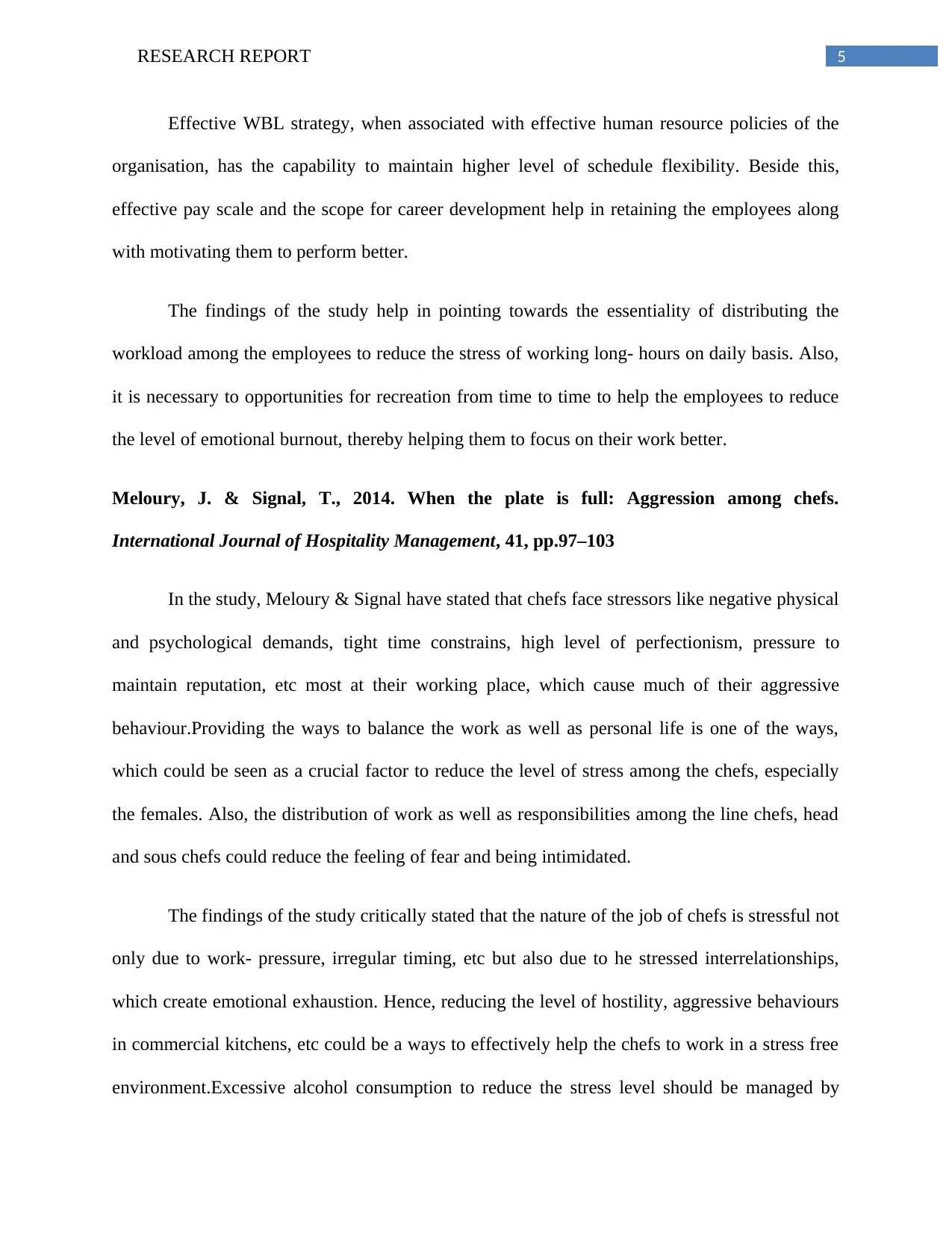
5RESEARCH REPORT
Effective WBL strategy, when associated with effective human resource policies of the
organisation, has the capability to maintain higher level of schedule flexibility. Beside this,
effective pay scale and the scope for career development help in retaining the employees along
with motivating them to perform better.
The findings of the study help in pointing towards the essentiality of distributing the
workload among the employees to reduce the stress of working long- hours on daily basis. Also,
it is necessary to opportunities for recreation from time to time to help the employees to reduce
the level of emotional burnout, thereby helping them to focus on their work better.
Meloury, J. & Signal, T., 2014. When the plate is full: Aggression among chefs.
International Journal of Hospitality Management, 41, pp.97–103
In the study, Meloury & Signal have stated that chefs face stressors like negative physical
and psychological demands, tight time constrains, high level of perfectionism, pressure to
maintain reputation, etc most at their working place, which cause much of their aggressive
behaviour.Providing the ways to balance the work as well as personal life is one of the ways,
which could be seen as a crucial factor to reduce the level of stress among the chefs, especially
the females. Also, the distribution of work as well as responsibilities among the line chefs, head
and sous chefs could reduce the feeling of fear and being intimidated.
The findings of the study critically stated that the nature of the job of chefs is stressful not
only due to work- pressure, irregular timing, etc but also due to he stressed interrelationships,
which create emotional exhaustion. Hence, reducing the level of hostility, aggressive behaviours
in commercial kitchens, etc could be a ways to effectively help the chefs to work in a stress free
environment.Excessive alcohol consumption to reduce the stress level should be managed by
Effective WBL strategy, when associated with effective human resource policies of the
organisation, has the capability to maintain higher level of schedule flexibility. Beside this,
effective pay scale and the scope for career development help in retaining the employees along
with motivating them to perform better.
The findings of the study help in pointing towards the essentiality of distributing the
workload among the employees to reduce the stress of working long- hours on daily basis. Also,
it is necessary to opportunities for recreation from time to time to help the employees to reduce
the level of emotional burnout, thereby helping them to focus on their work better.
Meloury, J. & Signal, T., 2014. When the plate is full: Aggression among chefs.
International Journal of Hospitality Management, 41, pp.97–103
In the study, Meloury & Signal have stated that chefs face stressors like negative physical
and psychological demands, tight time constrains, high level of perfectionism, pressure to
maintain reputation, etc most at their working place, which cause much of their aggressive
behaviour.Providing the ways to balance the work as well as personal life is one of the ways,
which could be seen as a crucial factor to reduce the level of stress among the chefs, especially
the females. Also, the distribution of work as well as responsibilities among the line chefs, head
and sous chefs could reduce the feeling of fear and being intimidated.
The findings of the study critically stated that the nature of the job of chefs is stressful not
only due to work- pressure, irregular timing, etc but also due to he stressed interrelationships,
which create emotional exhaustion. Hence, reducing the level of hostility, aggressive behaviours
in commercial kitchens, etc could be a ways to effectively help the chefs to work in a stress free
environment.Excessive alcohol consumption to reduce the stress level should be managed by
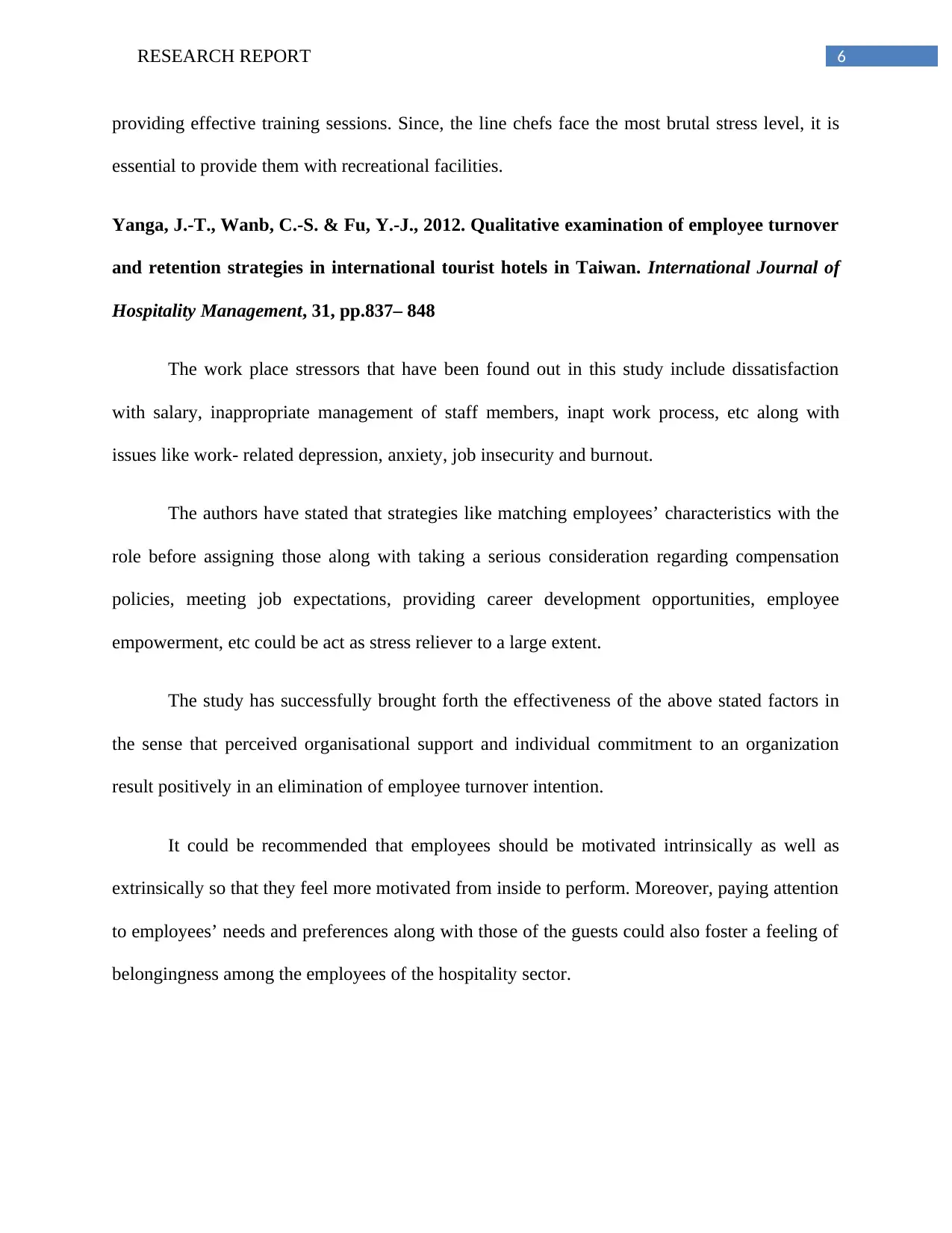
6RESEARCH REPORT
providing effective training sessions. Since, the line chefs face the most brutal stress level, it is
essential to provide them with recreational facilities.
Yanga, J.-T., Wanb, C.-S. & Fu, Y.-J., 2012. Qualitative examination of employee turnover
and retention strategies in international tourist hotels in Taiwan. International Journal of
Hospitality Management, 31, pp.837– 848
The work place stressors that have been found out in this study include dissatisfaction
with salary, inappropriate management of staff members, inapt work process, etc along with
issues like work- related depression, anxiety, job insecurity and burnout.
The authors have stated that strategies like matching employees’ characteristics with the
role before assigning those along with taking a serious consideration regarding compensation
policies, meeting job expectations, providing career development opportunities, employee
empowerment, etc could be act as stress reliever to a large extent.
The study has successfully brought forth the effectiveness of the above stated factors in
the sense that perceived organisational support and individual commitment to an organization
result positively in an elimination of employee turnover intention.
It could be recommended that employees should be motivated intrinsically as well as
extrinsically so that they feel more motivated from inside to perform. Moreover, paying attention
to employees’ needs and preferences along with those of the guests could also foster a feeling of
belongingness among the employees of the hospitality sector.
providing effective training sessions. Since, the line chefs face the most brutal stress level, it is
essential to provide them with recreational facilities.
Yanga, J.-T., Wanb, C.-S. & Fu, Y.-J., 2012. Qualitative examination of employee turnover
and retention strategies in international tourist hotels in Taiwan. International Journal of
Hospitality Management, 31, pp.837– 848
The work place stressors that have been found out in this study include dissatisfaction
with salary, inappropriate management of staff members, inapt work process, etc along with
issues like work- related depression, anxiety, job insecurity and burnout.
The authors have stated that strategies like matching employees’ characteristics with the
role before assigning those along with taking a serious consideration regarding compensation
policies, meeting job expectations, providing career development opportunities, employee
empowerment, etc could be act as stress reliever to a large extent.
The study has successfully brought forth the effectiveness of the above stated factors in
the sense that perceived organisational support and individual commitment to an organization
result positively in an elimination of employee turnover intention.
It could be recommended that employees should be motivated intrinsically as well as
extrinsically so that they feel more motivated from inside to perform. Moreover, paying attention
to employees’ needs and preferences along with those of the guests could also foster a feeling of
belongingness among the employees of the hospitality sector.
⊘ This is a preview!⊘
Do you want full access?
Subscribe today to unlock all pages.

Trusted by 1+ million students worldwide

7RESEARCH REPORT
Paraphrase This Document
Need a fresh take? Get an instant paraphrase of this document with our AI Paraphraser
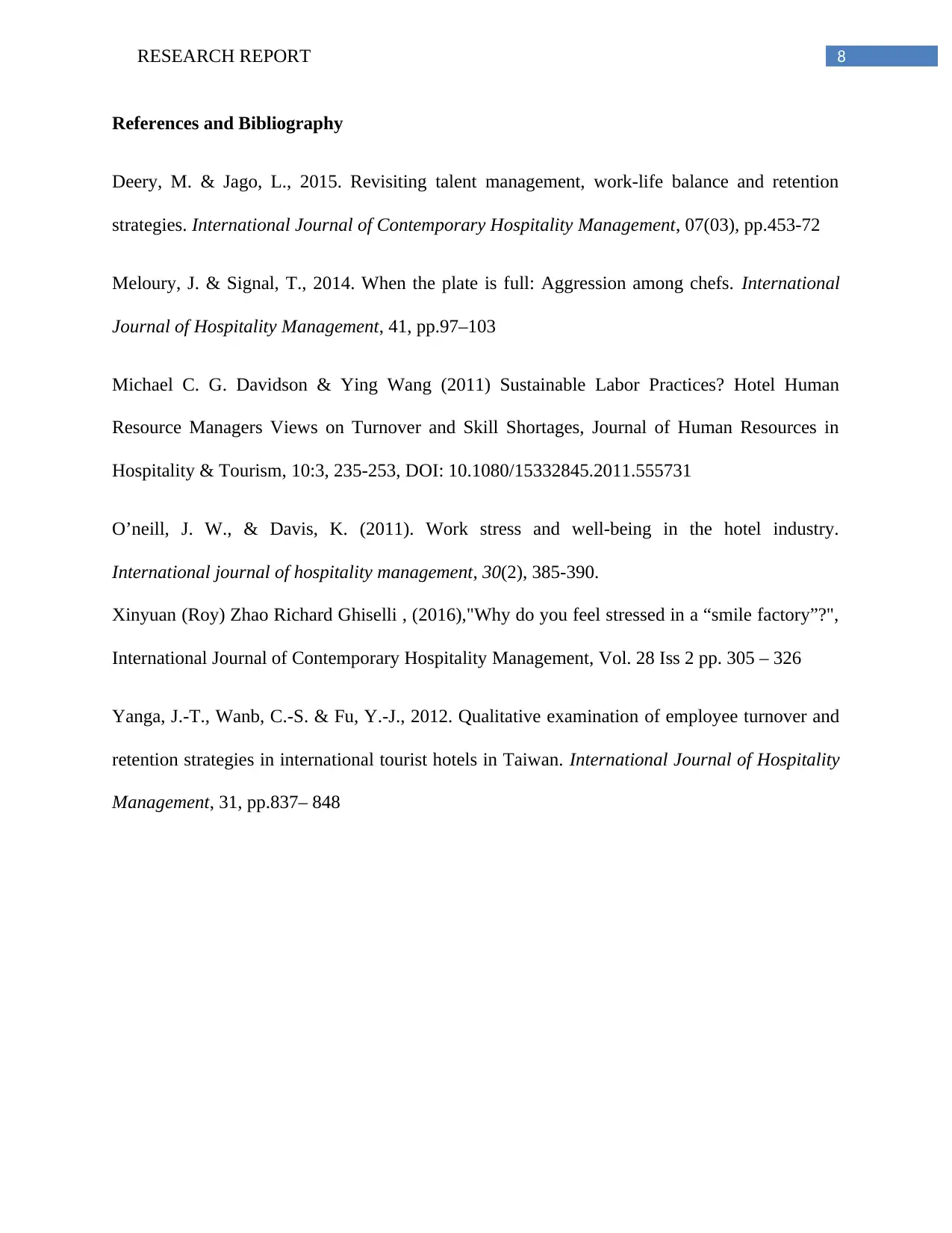
8RESEARCH REPORT
References and Bibliography
Deery, M. & Jago, L., 2015. Revisiting talent management, work-life balance and retention
strategies. International Journal of Contemporary Hospitality Management, 07(03), pp.453-72
Meloury, J. & Signal, T., 2014. When the plate is full: Aggression among chefs. International
Journal of Hospitality Management, 41, pp.97–103
Michael C. G. Davidson & Ying Wang (2011) Sustainable Labor Practices? Hotel Human
Resource Managers Views on Turnover and Skill Shortages, Journal of Human Resources in
Hospitality & Tourism, 10:3, 235-253, DOI: 10.1080/15332845.2011.555731
O’neill, J. W., & Davis, K. (2011). Work stress and well-being in the hotel industry.
International journal of hospitality management, 30(2), 385-390.
Xinyuan (Roy) Zhao Richard Ghiselli , (2016),"Why do you feel stressed in a “smile factory”?",
International Journal of Contemporary Hospitality Management, Vol. 28 Iss 2 pp. 305 – 326
Yanga, J.-T., Wanb, C.-S. & Fu, Y.-J., 2012. Qualitative examination of employee turnover and
retention strategies in international tourist hotels in Taiwan. International Journal of Hospitality
Management, 31, pp.837– 848
References and Bibliography
Deery, M. & Jago, L., 2015. Revisiting talent management, work-life balance and retention
strategies. International Journal of Contemporary Hospitality Management, 07(03), pp.453-72
Meloury, J. & Signal, T., 2014. When the plate is full: Aggression among chefs. International
Journal of Hospitality Management, 41, pp.97–103
Michael C. G. Davidson & Ying Wang (2011) Sustainable Labor Practices? Hotel Human
Resource Managers Views on Turnover and Skill Shortages, Journal of Human Resources in
Hospitality & Tourism, 10:3, 235-253, DOI: 10.1080/15332845.2011.555731
O’neill, J. W., & Davis, K. (2011). Work stress and well-being in the hotel industry.
International journal of hospitality management, 30(2), 385-390.
Xinyuan (Roy) Zhao Richard Ghiselli , (2016),"Why do you feel stressed in a “smile factory”?",
International Journal of Contemporary Hospitality Management, Vol. 28 Iss 2 pp. 305 – 326
Yanga, J.-T., Wanb, C.-S. & Fu, Y.-J., 2012. Qualitative examination of employee turnover and
retention strategies in international tourist hotels in Taiwan. International Journal of Hospitality
Management, 31, pp.837– 848
1 out of 8
Related Documents
Your All-in-One AI-Powered Toolkit for Academic Success.
+13062052269
info@desklib.com
Available 24*7 on WhatsApp / Email
![[object Object]](/_next/static/media/star-bottom.7253800d.svg)
Unlock your academic potential
Copyright © 2020–2026 A2Z Services. All Rights Reserved. Developed and managed by ZUCOL.





